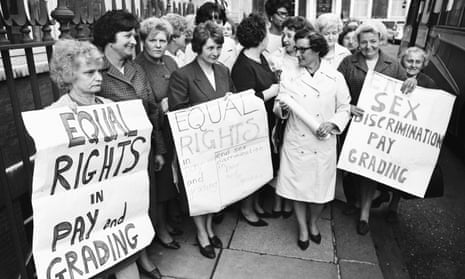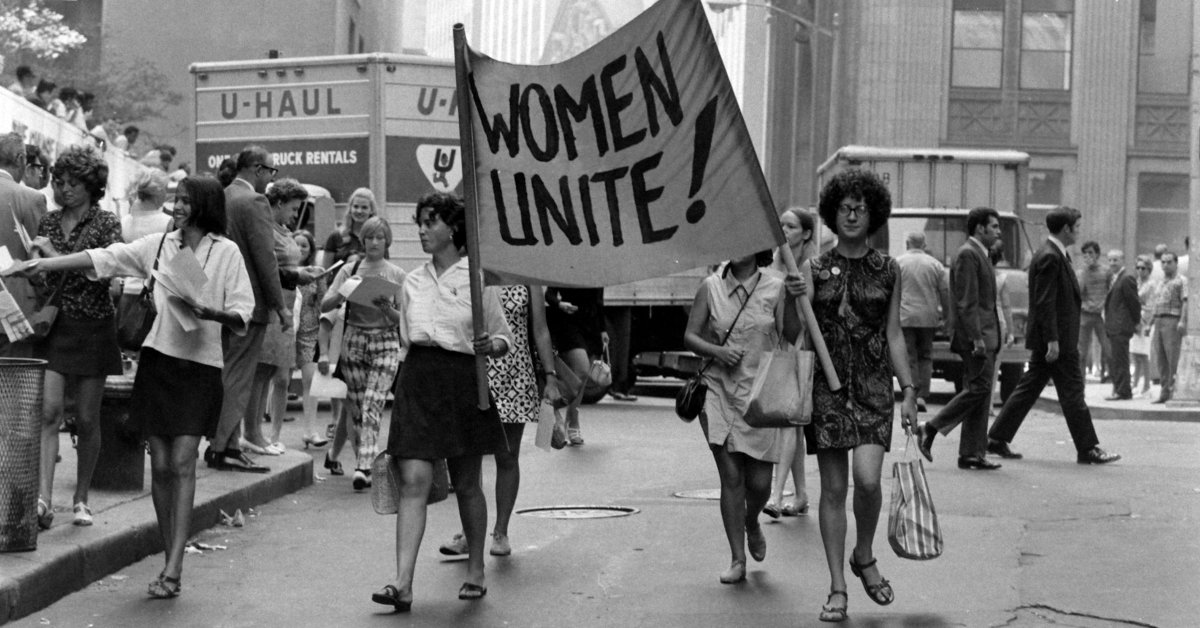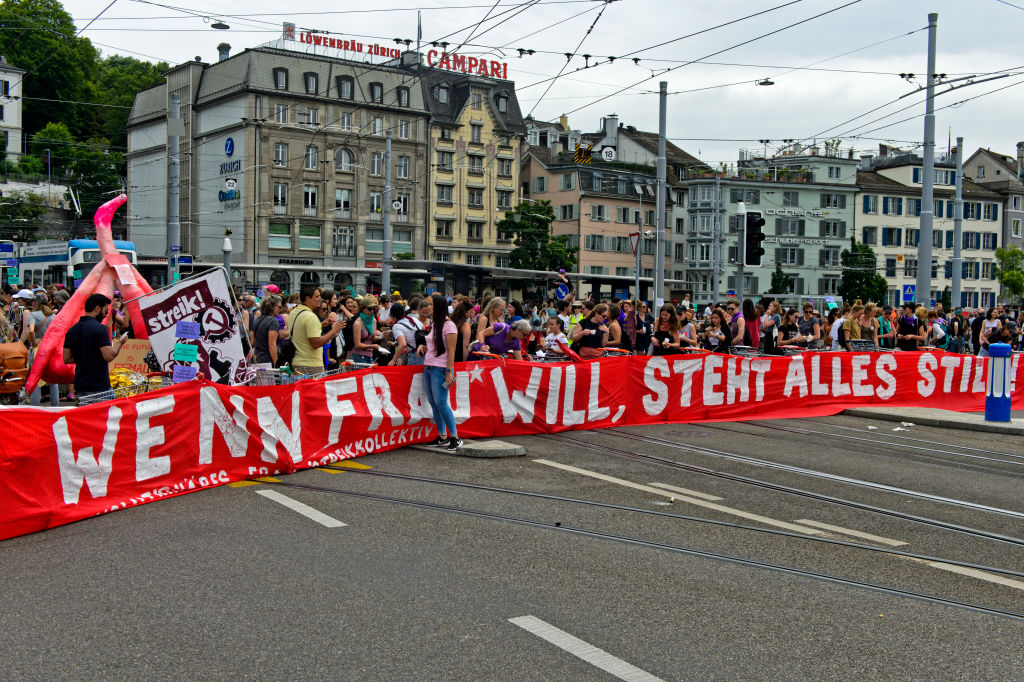On 24 October 1975, 75,000 women in Iceland left their jobs, children and homes and took to the streets for a general strike that was billed “Women’s Day Off”. In Reykjavik, 30,000 women marched up the Laugavegur (wash road), as a women’s brass band played the marching tune from Shoulder to Shoulder, a British TV series about the suffragettes which had recently aired in this small Nordic nation. Flyers fluttered against clear autumn skies: “We march because it is commonly said about a housewife: ‘She is not working, she is just keeping house’,” they read. “We march because the work experience of a housewife is not considered of any value in the labour market.”
For Icelandic men, this day became known as the “Long Friday”. With no women to staff desks and tills, banks, factories and many shops were forced to close, as were schools and nurseries – leaving many fathers with no choice but to take their children to work. There were reports of men arming themselves with sweets and colouring crayons to entertain the swarms of children in their workplaces, or bribing older children to look after their siblings. Sausages (easy to cook, of course, and a hit with children the world over) were in such demand that shops sold out; children could be heard giggling in the background while male newsreaders reported the day’s events on the radio.

Many of the greatest successes of feminism have come in moments when boots were on the ground; and our bodies elsewhere to the posts ascribed to women by patriarchal capitalism. In the UK, public reaction to the sexual violence meted out against the 300 women who marched to parliament demanding women’s suffrage on 18 November 1910, Black Friday, was instrumental in gaining the vote for women. The 1968 strike by Ford’s women sewing machinists at Dagenham, which was followed by 1970 strikes by women clothing workers in Leeds, were landmark labour-relations dispute that triggered the passing of the Equal Pay Act 1970.
Yet domestic labour has always been a tricky injustice to protest against. It takes place in the privacy of the home, making it difficult for women to see each other doing this work and to collectively acknowledge that men do not share equally in its burden (and they don’t: the average British woman still contributes 60% more washing, wiping and childcare a week than the average British man, even as the pandemic has increased this work to around nine hours per day). And there can also be dire consequences if we withdraw this labour: children uncared for and vulnerable relatives unfed.
:max_bytes(150000):strip_icc()/Women-1970-Strike-GettyImages-174007370-571ba2265f9b58857dd27444.jpg)
“A women’s strike is impossible; that is why it is necessary,” claims Women’s Strike Assembly (WSA), an activist alliance that, to mark last week’s International Women’s Day, called for a series of banner memorials to be erected around the UK to declare why #westrike as women (or, just as importantly, why we can’t). In a manifesto published in November, WSA wrote: “We strike because we are tired of our labour being taken for granted. We strike because we now have to do a triple shift: our paid work, our unpaid domestic labour and educating our children during the pandemic.”
In Liverpool, Bristol and Edinburgh women gathered, last Monday, in socially distanced clusters toting their banner memorials. “#westrike because we are tired. Very, very tired,” a banner in Liverpool read and a memorial painted by Bristol Sisterhood stated, simply: “Fuck macho bullshit, women on fire.” Many of the social media protests, however, indicated why last Monday saw no wholesale abandonment of women’s posts. “I am a freelancer and I would not get paid (or lose my client!). But I’m striking with my compañeras in mind and spirit,” one IWD banner read, and another: “I cannot strike but I lit a candle in solidarity.”

Recent years have seen a flowering of strikes against gendered labour in Spain and South America. In 2018, six million women joined Spain’s 2018 “Dia Sin Mujeres’ (day without women), including Madrid’s Manuela Carmena and actress Penelope Cruz, as “feminist men in solidarity” staffed a network of collective nurseries. Old-fashioned mother’s aprons, the symbol of the strikes, were stitched in solidarity workshops and strung from balconies. But, in Britain, women’s general labour strikes have been conspicuously absent.
Selma James, the cofounder of 70s marxist activist project Wages for Housework, has a theory to account for this lack. She points out that as the power of unions dwindles, the climate in Anglo-Saxon countries is less hospitable to gestures of withdrawn labour, even as feminist identity marches gain broader support. Without union protection, British and north American women who strike from paid work risk losing their jobs; to the single mum on the breadline in a pandemic, strikes, in this context, seem the preserve of privileged white feminists.

For all this, calling political attention to the pandemic’s third shift is an urgent project. Only 36% of British women have been able to continue working full time alongside their caring responsibilities during the pandemic, compared to 66% of men, and mothers are more likely to have quit or lost their job. As the pandemic recedes over a nation of shattered women, there will be opportunities for direct action. Women’s March, Pregnant Then Screwed and Women’s Strike Assembly, among others, are calling for protests and marches to highlight the structural sexism that’s left women bearing the brunt of reproductive labour during this year of crisis.
James, in the meantime, advocates a daily constellation of “small resistances”: banging pots and pans at your window; stringing up a banner and apron; radically lowering domestic standards.
Forty-five years after the Women’s Day Off, Iceland has ranked top in the World Economic Forum’s Global Gender Gap Report – an index that examines educational opportunities, life expectancy, pay equity and the average time spent on housework – in 13 of the past 16 years. Yes, it’s impossible for many women to strike; but can we afford not to?








